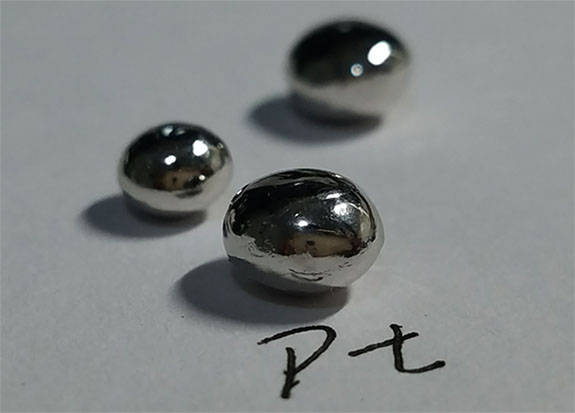Scientists at Washington State University (WSU) were stunned when platinum outperformed gold in a test to determine how much pressure they could take.
Prior to the study, the scientists at WSU's Institute for Shock Physics speculated that gold would be the victor, but the final results weren't even close.
Platinum easily held its atomic structure at 3.5 million atmospheres, the pressure at the center of Earth. Then the researchers pushed platinum even further, and the metal continued to hold its structure to nearly 4 million atmospheres, at which point it reached 3,215 degrees Fahrenheit and began to melt.
On the other hand, the researchers were surprised when gold's structural integrity began to fail at a relatively modest 1.5 million atmospheres.
“Science is all about curiosity,” said Yogendra Gupta, director of the Institute for Shock Physics at WSU. “Even though I had 48 years of experience in this field, and I was certain gold would behave as I suspected, I was just wrong. That is why we do experiments in science.”
In the test, scientists used a powerful laser to subject four types of metals to immense pressure over short intervals of about 10 to 15 billionths of a second. They then used a synchrotron to send x‑ray pulses into the materials to study the changes in their physical structure.
“Basically, we can look inside things and provide information about their atomic structure,” Gupta said. “This is the only synchrotron-based facility in the US capable of doing these kinds of experiments.”
Silver and copper were also put to the test. Surprisingly, silver matched gold's performance, while copper lasted a little longer before transforming at 1.7 million atmospheres of pressure.
One atmosphere of pressure is what an average person will experience at sea level. At a depth of 5,000 meters (about 3 miles), the pressure will be approximately 500 atmospheres or 500 times greater than the pressure at sea level.
“It’s really just pure fun science more than anything, but nevertheless I find it fascinating,” Gupta said. “I kind of laugh about it because you will never produce 1.5 million atmospheres of pressure in any real-world scenario. For all practical purposes gold is stable.”
Platinum's superior performance at WSU's Institute for Shock Physics aligns neatly with the messaging on the website of the trade organization Platinum Guild International (PGI).
Writes the PGI, "It takes a lot to say 'forever,' but when you’re selecting bridal jewelry—or any jewelry, for that matter—it’s important to know that platinum is truly eternal. This noble metal, one of the strongest, natural materials on the planet, is also one of the longest lasting."
And now we've learned that platinum also performs best under pressure.
Credit: Image by 2x910, CC BY-SA 4.0, via Wikimedia Commons.

No comments:
Post a Comment